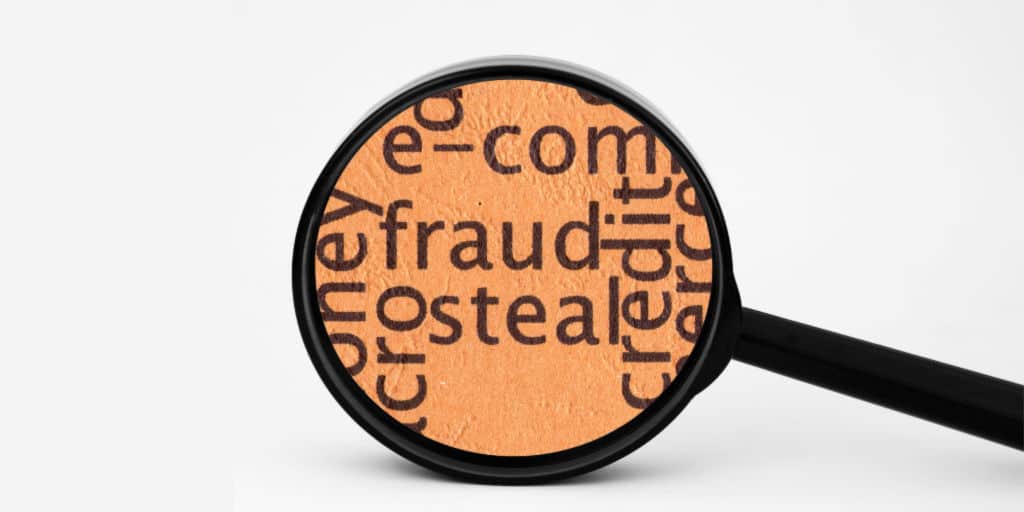What is Elder Fraud and How Do We Prevent It?
(This page may contain affiliate links and we may earn fees from qualifying purchases at no additional cost to you. See our Disclosure for more info.)
Elder fraud is a large and growing problem, costing many seniors the savings they worked hard for in their younger years. Reports indicate older Americans lose anywhere between $2.9 to $36.5 billion each year.
According to the U.S. Consumer Financial Protection Bureau, individual victims of elder financial fraud lose an average of $34,200. In 7% of the cases, victims lose over $100,000.
Even more, these statistics represent only the reported cases of elder fraud, a severely underreported problem.
In this article, we’ll talk about what elder fraud is and how you can protect yourself and your loved ones from becoming victims of this crime.
What is Elder Fraud?
Elder fraud is a form of elder abuse. It occurs when someone deceives a vulnerable older person to steal or illegally gain access to the victim’s money or property.

Why are Older Adults Frequent Targets of Financial Fraud?
There are several reasons seniors are targets of financial fraud:
- They’re more likely to have accumulated wealth in retirement accounts, savings, and other investments.
- They’re often more willing to listen and trust people than younger generations.
- They can be more vulnerable. They might be frail, ill, mentally impaired, disabled, isolated, recently widowed, or inexperienced at handling finances, to name a few.
- Many seniors live alone. Loneliness can make them more likely to trust others. And when they live alone, there’s no one around to stop or report fraud.
Related reading: Guide to Caring For Elderly Relatives
Who Commits Elder Fraud?
Those who commit fraud against seniors can be anyone. They can be strangers, acquaintances, friends, neighbors, and even family members.
Friends and loved ones can commit elder fraud. Sometimes it’s a grandchild calling grandpa for money. Other times, it’s a caregiver who siphons money from the victim without them realizing it.
Reports show the financial losses are higher when the victim knows the offender. Even people who should be protecting seniors from elder abuse can commit the crime.
Appointed fiduciaries, like those with Power of Attorney, have a legal responsibility to put the best interests of the person first. Yet fiduciaries commit elder fraud, with an average loss of $83,600 per victim.
Strangers are also responsible for elder fraud cases. Strangers who commit fraud do so through the telephone, internet, or in-person. They pretend to be someone who wants to provide a service or otherwise help the victim.
Even in-person scammers appear to be “official,” with paperwork, certifications, and sometimes even uniforms.
How Can We Prevent Elder Fraud?
Be Involved
Prevention is the easiest way to fight elder fraud. One of the best ways to prevent this crime is to stay in contact with older adults in your life. Call or visit your elderly family members, neighbors, and friends.
When you talk regularly, you know their demeanor, activities, and the people in their lives. And, if they’re open to it, it’s helpful to talk with them about their financial situation too.
With all this information, it’s easier to spot the red flags of elder fraud.
Signs of Elder Fraud
It’s helpful to recognize the potential warning signs of elder fraud and report it as soon as it’s suspected.
Red flags of suspected elder fraud:
- The individual is hesitant to discuss money or financial concerns.
- There is unusual activity in a person’s financial accounts.
- They have higher than average credit card balances.
- Swift, new friends appear and go with the individual to new places.
- They have unpaid bills or collection letters.
- They are missing possessions.
- You notice a sudden change in the person’s emotional state or behavior.
- There are missing bank or credit card statements.
- They are missing checks.
- They open new credit cards.
- They have new documents or contracts put in place, such as a will or power of attorney. This is particularly concerning when the person doesn’t understand the document.
- They experience abrupt isolation or a significant change in daily activities unrelated to physical health.
- They change beneficiaries.
- They close accounts, such as CDs, savings, and investment accounts.
- They have a sudden change in memory or involvement in finances.
- A caregiver has a sudden change in lifestyle (not always a cause for concern, use your intuition and verify).
Consider Guardian and Conservatorship
You might consider becoming a guardian or conservator to help protect someone from becoming a victim of elder fraud. These designations are in place to protect the welfare of a person who is mentally or physically disabled.
Guardian or conservatorship is useful when an individual does not have a Power of Attorney (POA) in place, or when the POA is not acting in their best interest.
The Most Common Scams
One of the best ways to safeguard against elder fraud is to be aware of common scams.
In some cases, a fraudster takes money directly from the victim. But in others, it’s not so direct. Indirect fraud could be anything from gathering financial information to “selling” fraudulent products or services.
Below are some of the more frequent scams used to commit elder fraud:
Undue influence. This tactic can occur when the perpetrator has some power over the victim through relationship, dependency, or use of threats. They use trust or fear to coerce the victim into allowing access to their financial or proprietary resources illegally.
Medicare fraud. Fraudsters pose as Medicare representatives to access personal information and Medicare accounts. They bill Medicare for fraudulent services and equipment and keep the Medicare payment.
Counterfeit prescription drugs. When a senior does an online search for savings on their medication, they may come to a website that offers their medicines at a lower price. Often, the victim receives counterfeit drugs. This not only costs them money but can impact their health.
Home repair scam. Scammers approach elderly homeowners about home repairs to gain access to their house. Then they either steal from them or take money for home “repairs” they don’t complete.
Online Dating scam. Many seniors turn to online dating and are vulnerable to con artists posing as potential love interests. These con artists attempt to get close fast and talk to the victim often. The scammer concocts a “financial emergency” and asks the victim for money (often repeatedly).
Phishing scams. These are phone calls, texts, or emails that appear to be from the victims’ bank, investment, or credit card companies. They ask the victim to update their account information and steal that information to gain access to their identity and/or accounts.
Social security spoofing. Phone calls appear as a “Fraud Hotline” on caller ID. The scammer tells the victim that their social security number was used in fraudulent activity. They often use scare tactics to get personal information.
Internet fraud. Older adults aren’t as savvy with technology as younger generations. Inexperience can make them more vulnerable to online scams. They are more likely to click and download programs that can access personal information.
Fake legal documents. Official looking letters and materials attempt to get the victim to sign a contract or other document. The perpetrator then gains access to victims’ property or financial accounts.
Tech support scam. Scammers posing as computer technical support claim the victim has a fictional computer issue, such as a virus or hack. They convince the victim to allow them remote access to their computer and ask for payment for their “services.”
Lottery scam. The victim thinks they have won the lottery or a prize. To claim the prize, they have to pay taxes, insurance, or a fee. Often, the scammer will send along a check as “proof,” but when the victim deposits it, the check bounces.
Telemarketing/texting schemes. Posing as telemarketers, fraudsters can use this method for a variety of scams. These include identity theft, accessing account information, lottery scams, or selling fake products.
Grandparent scam. A stranger calls the victim and pretends to be a grandchild in need of financial help. They ask the senior to send money, but not to tell anyone else.
Funeral scams. Most funeral businesses genuinely care and conduct ethical business. But the funeral business is expensive and is ripe for criminals to step in and take advantage.
Casket scams are the most common. The fraud can involve showing people only the highest-priced caskets, promoting ineffective “protective” caskets, or selling caskets as a “necessity” with cremation services. Other deceptions include inflated package deals that show savings on the coffin when the victim pays funeral service fees upfront. These packages can cost thousands more than they should.
Though funeral scams can be hard to detect, being informed, comparison shopping, and taking a trusted friend or family member along can help. It’s also important to know that funeral businesses must detail the costs in writing when asked.
Laws and Reporting
There are laws in place to protect people from elder fraud. And most states have resources to help older Americans seek retribution and stop the person stealing from them.
But the most challenging thing about stopping elder fraud is reporting. Only 1 in 25 cases get reported, leaving many victims of elder fraud unprotected.
Financial institutions (and casinos) must report suspected elder fraud activity to the Treasury Department. But less than ⅓ of these reports get turned over to the authorities for further investigation.
Another issue is the lack of reporting from the victims. Some victims are confused and don't know they're part of a scam. Others fear retribution or embarrassment if they report the crime.
Still, others are apprehensive about reporting these crimes because they fear others may think they're mentally incompetent to handle their affairs.
If Someone You Know (or Yourself) is a Victim of Elder Fraud
- Talk to the suspected victim. Express your concerns or suspicions and let them know you have their best interests at heart.
- If you suspect elder fraud, report it to your local Department of Human Services.
- If the victim is in a nursing facility or assisted living, contact your local Long-Term Care Ombudsman Program.
- In the case of suspected identity theft, contact the Federal Trade Commission (FTC) and file an identity theft report.
- Alert all financial institutions and credit card companies of the suspected fraud.
- Report all cases of elder fraud to your local police department.
If you’re unsure of the right agency to contact for suspected elder fraud, check the Elder Abuse Resource Roadmap from the Department of Justice.
Closing Thoughts
Elder fraud is a growing and devastating crime. Becoming aware of the issue, learning what to look for, and knowing what to do when it happens are the first steps to fighting this type of financial abuse.
For more on elder fraud, you can check out the U.S. Senate Special Committee on Aging’s Fraud Book and information from the Department of Justice. Another useful resource is the Eldercare Locator’s page on Elder Rights.

Article written by Amanda, a team member of Women Who Money and the founder and blogger behind Why We Money where she enjoys writing about happiness, values, and personal finances.
